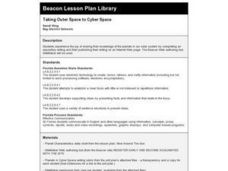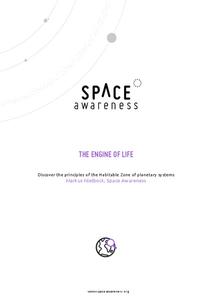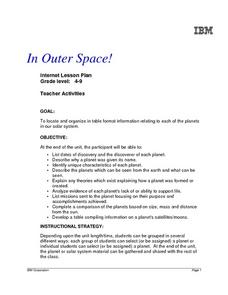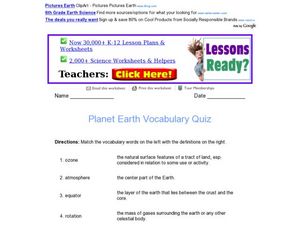Laboratory for Atmospheric and Space Physics
A Classroom Solar System
Create a scaled model of our solar system in your classroom! Scholars work collaboratively to build paper mache planets and hang them in their proper position to showcase each planet's location in the solar system.
Simply Worksheets
Solar System - Missing Words
In this space science worksheet, students complete nine sentence fill-in's about the planets in the solar system. There is no word bank.
Curated OER
Scale Model of the Solar System
Young scientists gain a better understanding of space, the solar system and its vastness by creating a scale model. Students first need to calculate the distance between each of the nine planets according to the size of their scale. This...
Mr. E. Science
Our Solar System
The presentation starts with the scientists who made discoveries about our solar system: Ptolemy, Copernicus, Galileo, Brahe, Kepler, and Newton. It also covers the planets, inner, outer, and Pluto, satellites, and an in-depth discussion...
Laboratory for Atmospheric and Space Physics
Planetary Distances on the Playground
There's no need to stay inside; get out of the classroom and create a scaled map of the solar system on your playground field! In collaborative groups, scholars identify the distance between the sun and other planets, place planet...
Curated OER
Taking Outer Space to Cyber Space
Use the Internet, write an expository text, and have students share their knowledge of the planets in our solar system. They compose an expository writing piece and publish it to a web page.
Curated OER
Organic Molecules Detected on Distant Planet!
Here is a planet worksheet in which learners read about organic molecules detected through spectral lines of the planet Osiris. They calculate the mass, the volume and the densities of common ingredients for planets including Osiris and...
TLS Books
Uranus
After reading an informational text passage, learners answer four multiple choice questions about the third largest planet in our solar system.
American Museum of Natural History
Beyond Planet Earth
Scholars take a journey through space with 16 eye-catching images. Along the way, learners read captions starting with the moon, then move onto asteroids, Mars, and Jupiter.
Curated OER
Planet Vacation
In this planets worksheet, students fill out a chart where they fill in the distance each planet is from the Earth, and how much travel time in years and hours it would take to get there. Students do this for 8 planets.
Curated OER
Exploring the Planets
Sixth graders explore the planets through an interactive web site. In this astronomy based lesson, 6th graders compare planets, explore comets, and discover planet facts through a variety of activities provided by the Smithsonian Museum.
Curated OER
The Webb Space Telescope: Detecting Dwarf Planets
In this detecting dwarf planets worksheet, high schoolers read about the Webb Space Telescope that will be launched in 2014 to detect dwarf planets using an infrared telescope. Students solve 3 problems and create a graph for each using...
Curated OER
Bellwork for Week 19-Electromagnetic Spectrum and Planets
For this bellwork on the electromagnetic spectrum and planets worksheet, learners answer questions about the information determined using a spectroscope, the geocentric and heliocentric models of planet rotation and the planets.
Curated OER
What's "In" There: A Study of the Inner Planets - Mercury, Venus, Earth, and Mars
First graders identify and explore the four inner planets. In this planet science lesson, 1st graders watch a PowerPoint about the planets. Students read the book Our Solar System and discuss the inner planets. Students create a book...
Virginia Department of Education
Solar System Model
How many planets can you name? Did you get all 13 in our solar system, including the dwarf planets, or were you surprised when you read there are 13 planets? The instructional activity helps scholars understand the scale of the universe...
Star Wars in the Classroom
Star Wars Geography Unit
What kind of animals live on an ice planet like Hoth? How would the habitat on Tatooine allow different organisms to thrive? Connect social studies, science, and Star Wars in one engaging activity that focuses on the ecosystems of the...
American Museum of Natural History
Cosmic Cookies
Scholars read about each planet then bake a plate of cosmic cookies—no-bake cookies decorated to look like the planets; Mercury, Venus, Earth, Mars, Jupiter, Saturn, Uranus, Neptune, and Pluto.
Space Awareness
The Engine of Life
There is a specific zone, or distance from a star, that a planet must be in order to have water in a liquid form. The activity demonstrates how flux density depends on its distance from the source. A photovoltaic cell gets power to drive...
Curated OER
Outer Space Creature
Students read poems by Shel Silverstein about planets and outer space. As a class, they compare and contrast his descriptions to actual facts which have been discovered through explorations. They write a description of an outer space...
Curated OER
In Outer Space
Students use the internet to gather information on the solar system. They identify the discoverer and unique characteristics of each planet. They compare and contrast each planet based on size, mass, and distance from the sun. They...
Curated OER
Hoop Trip To The Planets
Students practice locomotor patterns already introduced while reinforcing facts about each planet.
Curated OER
Planet Earth Vocabulary Quiz
For this planet Earth vocabulary worksheet, students draw lines to match 14 words that pertain to Earth science with their definitions.
TLS Books
Jupiter
Young astronomers read an informational text on the gas giant, Jupiter. Then they answer four multiple choice questions based on what they read.

























